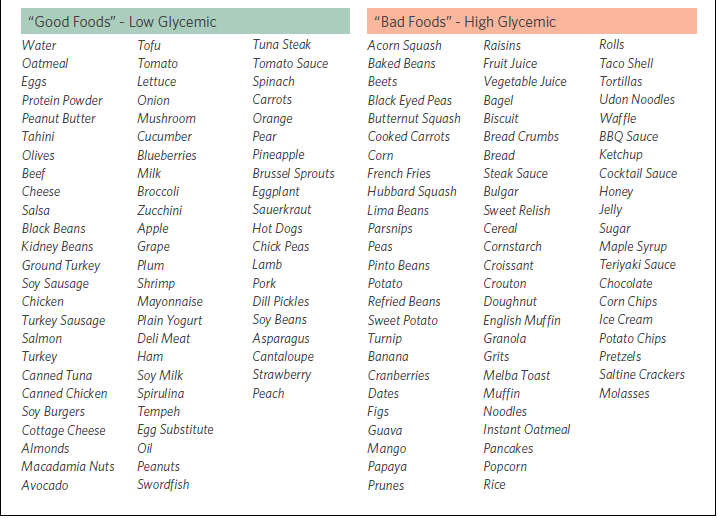Making low-glycemic food choices during the holidays will help keep you focused on building a family
 A quick internet search about the worst foods to eat during the holidays can pretty much sum up everything on the typical Thanksgiving and Christmas table, right down to the cranberry sauce! Being smart and choosing foods that are low-glycemic can help you stay fertility-friendly, especially for those diagnosed with PCOS. Watching what you eat, not only during the holiday season, will help you decrease insulin levels, lose weight, and can eventually lead to a pregnancy.
A quick internet search about the worst foods to eat during the holidays can pretty much sum up everything on the typical Thanksgiving and Christmas table, right down to the cranberry sauce! Being smart and choosing foods that are low-glycemic can help you stay fertility-friendly, especially for those diagnosed with PCOS. Watching what you eat, not only during the holiday season, will help you decrease insulin levels, lose weight, and can eventually lead to a pregnancy.
Virtually all cultures in the world have holidays at this time of the year to celebrate the successful production and storage of food to make it through the upcoming winter. Our ancestors created these traditions, like our Thanksgiving feast, by coming together with family, friends, and community. Of course, in the modern era, we’re less anxious about food availability but our traditions remain strong. And they seem to revolve around over-indulging in delicious foods and dishes. After all, food is love, right?
Patients with PCOS and insulin resistance should look for low-glycemic foods
Many of our patients, especially those diagnosed with PCOS, or polycystic ovary syndrome, are struggling with obesity and insulin resistance, two big obstacles in the goal of becoming pregnant. Many of you are following our advice on specific dietary strategies and using medication to address the insulin resistance. Insulin resistance is a hallmark of a polycystic ovary syndrome diagnosis. Those of you out there who are suffering with this disease know how difficult it is to lose weight.

For our patients with PCOS and insulin resistance, the best strategy is a “low-glycemic index” diet. The chart included here will help you identify which foods to focus on and which to avoid or eat very little of. The goal here is to prevent wide swings in insulin production in response to variable blood glucose levels during digestion. This is achieved by paying attention to the quality, or complexity, of the carbohydrates in each meal as well as making sure that adequate proteins and good fats are eaten in the same meal. This can be very challenging when surrounded by mass quantities of tempting simple carbohydrates masquerading as holiday cookies, pies, cakes, candy, breads, biscuits, stuffing, dressing, garnishes, gravy…the list goes on and on.
Making a plan about the foods you eat during the holidays can have long-term effects.
A greater part of any battle is psychological. It is very easy to succumb to thought processes that sound like these: “I’ll just cheat today and make up for it tomorrow” or “I’ll enjoy the holidays then get back on track when they are over” or “I don’t want to deprive myself when everyone around me is enjoying themselves.” Such deferrals can then stretch from one day, to a few, then many more. It is all too easy to fall off a healthy track. The holiday season may be many weeks long and, by the end of that time, the accumulated weight gain (or “pay-back”) can be worse than where it started. And we all know how hard to is to start over. Not to mention the headaches, mood swings, low energy, and fatigue that usually comes with sugar withdrawals.
So, whether you are the one cooking for the holiday or the one on the receiving end of another’s recipes, finding the right balance during all this holiday eating is important. Think ahead about what your food choices are going to be and focus on the protein and vegetable selections. Keep in mind that gravy is made of mostly white flour (very simple carb) and that mashed potatoes look just like pure sugar to your metabolism. If you do indulge in some of the tempting carbs, try to keep it limited to very small samplings rather than a full serving. And don’t fall prey to the thought that limiting your intake to just a small amount of “forbidden” foods to the exclusion of protein and good fats will compensate. Remember it’s not just about calories (although they do add up!) but about how much insulin is provoked.
And remember the goal: optimizing metabolism so that normal reproduction (and a baby!) can occur. Failure to plan is planning to fail. A holiday season is short compared to the lifetime that you are trying to create. Make a plan for success!
If you are ready to see a fertility specialist, or want to learn more about our practice, please give us a call at 888-467-BABY (2229) or fill out the form below:


